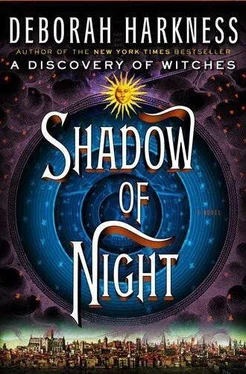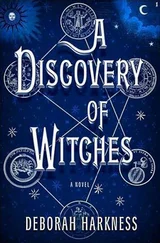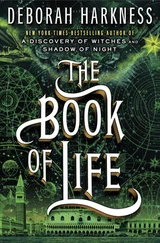Jack flushed. “That was my last piece of paper. Do they sell paper in Prague?” Back in London, Matthew had taken to supplying Jack with a pocketful of paper scraps every morning. How Jack went through them was a matter of some speculation.
“The city is awash in the stuff,” Matthew said. “Pierre will take you to the shop in Malá Strana tomorrow.”
After that exciting promise, it was hard to get the children upstairs, but Tereza proved to possess the precise mix of gentleness and resolve to accomplish the task. That gave the four grown-ups a chance to talk freely.
“Has Jack been sick?” Matthew asked Pierre with a frown.
“No, milord . Since we left you, his sleep has been troubled.” Pierre hesitated. “I think the evils in his past haunt him.”
Matthew’s forehead smoothed out, but he still looked concerned. “And otherwise the journey was as you expected?” This was his cagey way of asking whether they had been set upon by bandits or plagued by supernatural or preternatural beings.
“It was long and cold,” Pierre said matter-of-factly, “and the children were always hungry.”
Gallowglass bellowed with laughter. “Well, that sounds about right.”
“And you, milord ?” Pierre shot a veiled glance at Matthew. “Is Prague as you expected?”
“Rudolf hasn’t seen me. Rumor has it that Kelley is on the uppermost reaches of the Powder Tower blowing up alembics and God-knows-whatelse,” Matthew reported.
“And the Old Town?” Pierre asked delicately.
“It is much as it ever was.” Matthew’s tone was breezy and light—a dead giveaway that he was concerned about something.
“So long as you ignore the gossip coming from the Jewish quarter. One of their witches has made a creature from clay who prowls the streets at night.” Gallowglass turned innocent eyes on his uncle. “Saving that, it is practically unchanged from the last time we were here to help Emperor Ferdinand secure the city in 1547.”
“Thank you, Gallowglass,” Matthew said. His tone was as chilly as the wind off the river.
Surely it would require more than an ordinary spell to construct a creature from mud and set it in motion. Such a rumor could mean only one thing: Somewhere in Prague was a weaver like me, one who could move between the world of the living and the world of the dead. But I didn’t have to call Matthew on his secret. His nephew beat me to it.
“You didn’t think you could keep news of the clay creature from Auntie?” Gallowglass shook his head in amazement. “You don’t spend enough time at the market. The women of Malá Strana know everything, including what the emperor is having for breakfast and that he’s refused to see you.”
Matthew ran his fingers over the painted wooden surface of the triptych and sighed. “You’ll have to take this up to the palace, Pierre.”
“But that is the altarpiece from Sept-Tours,” Pierre protested. “The emperor is known for his caution. Surely it is only a matter of time before he admits you.”
“Time is the one commodity we lack—and the de Clermonts have altarpieces aplenty,” Matthew said ruefully. “Let me write a note to the emperor, and you can be on your way.”
Matthew dispatched Pierre and the painting shortly thereafter. His servant returned just as empty-handed as Matthew had, with no assurances of a future meeting.
All around me the threads that bound the worlds were tightening and shifting in a weaving whose pattern was too large for me to perceive or understand. But something was brewing in Prague. I could feel it.
That night I awoke to the sound of soft voices in the room adjoining our bedchamber. Matthew was not next to me, reading, as he had been when I’d dropped off to sleep. I padded to the door to see who was with him.
“Tell me what happens when I shade the side of the monster’s face.” Matthew’s hand moved swiftly over the large sheet of foolscap before him.
“It makes him seem farther away!” Jack whispered, awestruck by the transformation.
“You try it,” Matthew said, handing Jack his pen. Jack gripped the pen with great concentration, his tongue stuck slightly out. Matthew rubbed the boy’s back with his hand, relaxing the taut muscles wrapped around his rangy frame. Jack was not quite sitting on his knee but leaning into the vampire’s comforting bulk for support. “So many monsters,” Matthew murmured, meeting my eyes.
“Do you want to draw yours?” Jack inched the paper in Matthew’s direction. “Then you could sleep, too.”
“Your monsters have frightened mine away,” Matthew said, returning his attention to Jack, his face grave. My heart hurt for the boy and all he had endured in his brief, hard life.
Matthew met my eyes again and indicated with a slight shift of his head that he had everything under control. I blew him a kiss and returned to the warm, feathery nest of our bed.
The next day we received a note from the emperor. It was sealed with thick wax and ribbons.
“The painting worked, milord ,” Pierre said apologetically.
“It figures. I loved that altarpiece. Now I’ll have a hell of a time getting my hands on it again,” Matthew said, sitting back in his chair. The wood creaked in protest. Matthew reached out for the letter. The penmanship was elaborate, with so many swirls and curlicues that the letters were practically unrecognizable.
“Why is the handwriting so ornate?” I wondered.
“The Hoefnagels have arrived from Vienna and have nothing to occupy their time. The fancier the handwriting, the better, as far as His Majesty is concerned,” Pierre replied cryptically.
“I’m to go to Rudolf this afternoon,” Matthew said with a satisfied smile, folding up the message. “My father will be pleased. He sent some money and jewels, too, but it would appear that the de Clermonts got off lightly this time.”
Pierre held out another, smaller letter, addressed in a plainer style. “The emperor added a postscript. In his own hand.”
I looked over Matthew’s shoulder as he read it.
“Bringen das Buch. Und die Hexe .” The emperor’s swirling signature, with its elaborate R , looping d and l , and double f ’s, was at the bottom.
My German was rusty, but the message was clear: Bring the book. And the witch .
“I spoke too soon,” Matthew muttered.
“I told you to hook him with Titian’s great canvas of Venus that Grandfather took off King Philip’s hands when his wife objected to it,” Gallowglass observed. “Like his uncle, Rudolf has always been unduly fond of redheads. And saucy pictures.”
“And witches,” my husband said under his breath. He threw the letter on the table. “It wasn’t the painting that baited him, but Diana. Maybe I should refuse his invitation.”
“That was a command, Uncle.” Gallowglass’s brow lowered.
“And Rudolf has Ashmole 782,” I said. “It’s not going to simply appear in front of the Three Ravens on Sporrengasse. We’re going to have to find it.”
“Are you calling us ravens, Auntie?” Gallowglass said with mock offense.
“I’m talking about the sign on the house, you great oaf.” Like every other residence on the street, ours had a symbol over the door rather than a house number. After the neighborhood caught fire in the middle of the century, the emperor’s grandfather had insisted on having some way to tell houses apart besides the popular sgraffito decorations scratched into the plaster.
Gallowglass grinned. “I knew very well what you were talking about. But I do love seeing you go all shiny like that when your glaem ’s raised.”
I pulled my disguising spell around me with a harrumph, dimming my shininess to more acceptable, human levels.
Читать дальше












